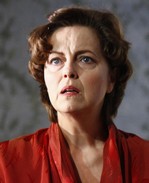SITE GUIDE
SEARCH
REVIEWS
REVIEW ARCHIVES
ADVERTISING AT CURTAINUP
FEATURES
NEWS
Etcetera and
Short Term Listings
LISTINGS
Broadway
Off-Broadway
NYC Restaurants
BOOKS and CDs
OTHER PLACES
Berkshires
London
California
New Jersey
DC
Philadelphia
Elsewhere
QUOTES
TKTS
PLAYWRIGHTS' ALBUMS
LETTERS TO EDITOR
FILM
LINKS
MISCELLANEOUS
Free Updates
Masthead
Writing for Us
A CurtainUp  London Review
London Review
 London Review
London ReviewThe Deep Blue Sea
|
When you're between any sort of devil and the deep blue sea, the deep blue sea sometimes looks very inviting.— Hester Collyer
|

Greta Scacchi as Hester Collyer
(Photo: Nobby Clark) |
Rattigan wrote the play in response to a personal tragedy, the death by suicide of a friend and ex-lover, the actor Ken Morgan. Why is it that everyone except Hester can see the inadequacy of the cad and bounder, the man she has deserted her husband for, Freddie Page (Dugald Bruce-Lockhart)? Or is it that she can see his shortcomings but still is in the grip of passion despite knowing how badly he is treating her?
Hester Collyer (Greta Scacchi) leaves her husband Judge William Collyer (Simon Williams) after falling in love with ex-RAF pilot Freddie Page (Dugald Bruce-Lockhart). She leaves a comfortable and affluent home for the excitement of a torrid romance with Freddie in seedy, rented accommodation in Ladbroke Grove. Ten months later, Freddie forgets her birthday and after staying out when they had planned dinner together, she takes a few pills and tries to gas herself. Her suicide attempt is foiled by not putting any money in the gas meter, and by the efforts of struck-off doctor, Mr Miller (Tim McMullan). Her husband is notified by two of the other tenants and calls round. Judge Collyer is concerned for his wife and forgiving, but the later attempt at reconciliation fails because she is looking for excitement and the nearest he gets to physical passion is to pat her cardigan back in place. Unemployed pilot, Page is busy extricating himself from the complications of the affair by getting a job in South America. Hester has no real means to support herself other than the hope of selling her paintings because married women in the 1950s tended to have no occupation other than housewife.
Greta Scacchi’s Hester has all the repression of a woman with a sensual nature who knows about the shame and desperation of her situation but is unable to prevent it happening. Scacchi has played abandoned women before and looks agonised. We are told that Hester is a clergyman’s daughter from Oxfordshire and in the 1950s divorce was so scandalous that Princess Margaret wasn’t allowed to marry a divorced man even though he was the "innocent" party. Scacchi's Hester is very vulnerable but completely lacking in humour, dragged down by the heavy emotions of her situation. As Page gropes her breasts we feel her desperation for affection from him. Freddie is a lothario, a casanova. When he reads the suicide note all he can think of is his reputation, that he would be blamed for breaking up her happy marriage and branded a murderer. He recounts other women who he has let down. "My God, how I hate getting tangled up in other people’s emotions. " he says. Later when he goes out, he cruelly puts a shilling on the table (for the gas meter) and says to Hester "Just in case I’m late for dinner."
Tim McMullan is very sympathetic as the neighbour who we feel has contemplated or even attempted suicide himself. Simon Williams as the judge cuts a very tall, stiff figure with a cracking voice but is powerless to find the words and gestures to bring his wife home although unusually he is willing to forgive her. I liked too those of the ensemble support like Jacqueline Tong’s landlady who add to the period feel of the production.
Francis O’Connor’s set is a boarding house with peeling wall paper with a partially gauze rear wall so we can see people on the stairs beyond the wall. When Page finds the suicide note there is a lighting shift and eerie music and the sound of the sea against a blue green backdrop as the play’s title is alluded to. In his parting scene, behind the gauze, we see Page momentarily look tearful on the stairs. Edward Hall gives a surprisingly involving production but I found the first act more believable and more satisfying than the second, probably because so little changes and the characters do not develop or progress.
|
The Deep Blue Sea
Written by Terence Rattigan Directed by Edward Hall Starring: Greta Scacchi With: Jacqueline Tong, Geoff Breton, Rebecca O’Mara, Tim McMullan, Simon Williams, Dugald Bruce-Lockhart, Jack Tarlton Design: Francis O’Connor Lighting: Peter Mumford Sound: Matt McKenzie Running time: Two hours 25 minutes with one interval Box Office: 0844 412 4663 Booking to 19th July 2008 Reviewed by Lizzie Loveridge based on 13th May 2008 performance at The VaudevilleTheatre, The Strand , London WC2 (Rail/Tube: Charing Cross) |
|
REVIEW FEEDBACK Highlight one of the responses below and click "copy" or"CTRL+C"
Paste the highlighted text into the subject line (CTRL+ V): Feel free to add detailed comments in the body of the email. |
|
London Theatre Tickets Lion King Tickets Billy Elliot Tickets Mighty Boosh Tickets Mamma Mia Tickets We Will Rock You Tickets Theatre Tickets |




